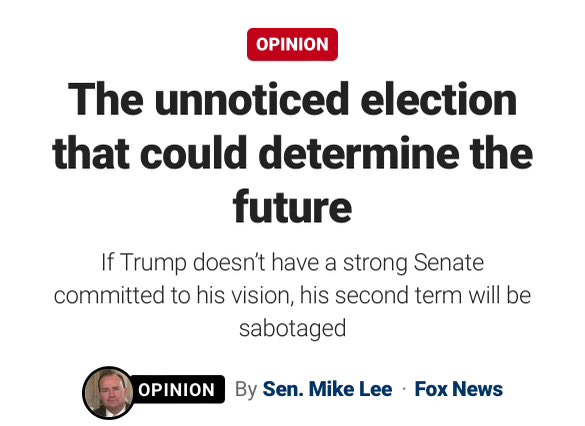🧵1. Tonight I hosted & moderated a forum for GOP senators, giving my colleagues a chance to hear from each of the three candidates running to replace McConnell. After hearing from each candidate, I’ve decided to support Rick Scott. Here are my takeaways:
2. As I’ve been saying for months, the Senate is supposed to be “the world’s greatest deliberative body,” but it has ceased to function as such in recent years, as majority leaders from both political parties have consolidated power at the expense of nearly every other senator.
3. Senators are supposed to have ample opportunity to debate, discuss, and amend important legislation, and the Senate rules offer important procedural protections to ensure such outcomes. Those rules have been short-circuited by leaders of both parties, empowering what I sometimes describe (in the current configuration of Congress) as “The Law Firm of Schumer, McConnell, Johnson, & Jeffries,” or simply “The Firm.”
4. The Firm’s vast power is good for The Firm and its members—and for a handful of lobbyists and staffers who serve as its acolytes—but it’s bad for the Senate as a whole, and especially bad for the American people.
5. For that reason, I’ve been calling on those running to become the next Senate GOP leader to agree to a series of reforms designed to restore rules, customs, and practices that in the past helped earn the Senate the (currently inaccurate) title of “the world’s greatest deliberative body.”
6. While I personally like all three leadership candidates and consider them friends—and while each offers a unique set of skills, experience, and plans that could prove useful to the Senate and the American people—Rick Scott stands out as the most aggressively reform-minded candidate.
7. Rick Scott offers the most specific, aggressive plan for restoring the Senate’s most time-honored traditions, rooted in its rules. And he’s embraced many of these reforms—which have been reflected in his votes & advocacy within the conference—since long before this race began.
8. Rick Scott has offered concrete plans for (a) protecting each senator’s ability to call up amendments and make them pending, (b) reforming the (currently barbaric) way in which the Senate passes spending bills, in which most senators have literally no meaningful opportunity to to amend—or even read and debate—spending bills negotiated in secret by The Firm, and (c) otherwise ensuring that the Senate GOP leader will work for those who elect him, and not the other way around.
9. Rick Scott’s approach is also the most closely aligned with and focused on helping President Trump enact his legislative agenda, which is supported by more than 75 million American voters.
10. With this in mind, I wholeheartedly endorse Rick Scott, and respectfully urge my colleagues—particularly those who agree that bold reforms are badly needed—to do the same.
11. All three candidates offered helpful perspectives on how our conference should operate, and I found the entire discussion refreshing and productive. But Rick Scott’s approach stands out, and that’s why I’ll be casting my vote for him.
12. Rick Scott has consistently called out abuses of the Senate GOP leader position in the past—even when it was difficult and at times politically costly to him. This is yet another reason to support him.
• • •
Missing some Tweet in this thread? You can try to
force a refresh







